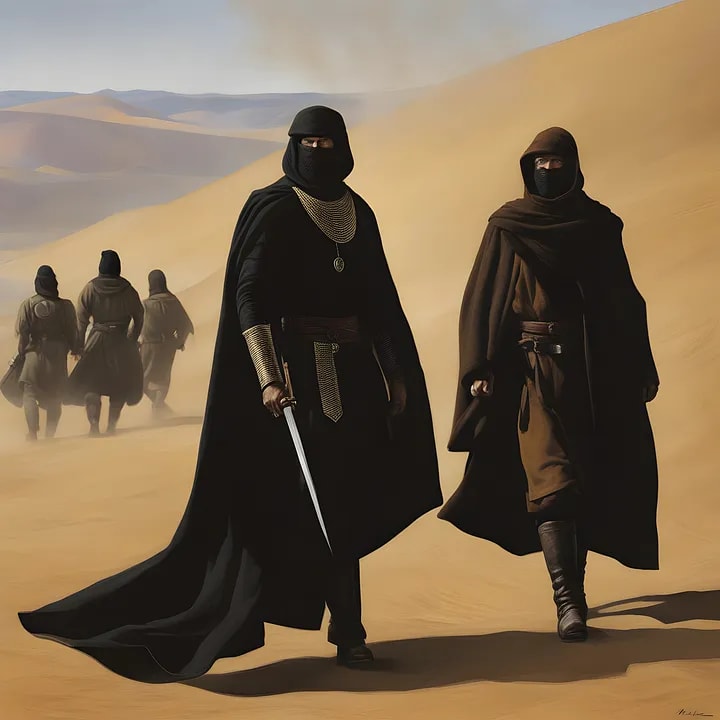“Dune” by Frank Herbert
Unveiling the Epic Universe of Arrakis

Frank Herbert’s science fiction masterwork “Dune” was first released in 1965. The “Dune” series, which has multiple sequels and has grown to be one of the most recognizable and significant works in the genre, begins with this novel. This epic story, which is set in a distant future where interstellar travel and complicated power dynamics rule the cosmos, mixes together aspects of politics, religion, ecology, and adventure.
The majority of the action takes place on the arid planet Arrakis, also known as Dune. It centers on the Atreides family, headed by Duke Leto Atreides, and their conflict over the planet’s valuable resource, melange, or “spice,” which extends life and improves mental faculties. This summary will give a quick rundown of the main characters, ideas, and incidents in “Dune,” encapsulating the core of this complex and fascinating book.
Part I: The Universe of Dune

The world of “Dune” is a vast, far-off universe where strong noble families rule entire planets and the spice melange, which has a profound impact on human thought, facilitates interplanetary travel. Emperor Shaddam IV supervises a feudal system of administration in the Imperium, a cosmic empire. The Atreides, Harkonnens, and Corrinos are the three most notable noble families.
Due to its emphasis on the arid planet Arrakis, “Dune” has a distinctive setting. As the sole known source of melange, which is necessary for space travel and gives its users a longer lifespan and enhanced mental powers, Arrakis is essential to the cosmos. The planet is dangerous and enigmatic because of its harsh climate, which includes a never-ending desert and enormous sandworms. The major conflict of the plot is set up by the Emperor’s choice to hand House Atreides control of Arrakis at the book’s outset.
Part II: House Atreides
Paul Atreides, the infant son of Duke Leto Atreides and Lady Jessica, is the main character in “Dune”. Duke Leto is dedicated to governing Arrakis in a fair and just manner, despite the various difficulties presented by the desert planet’s environment and the constant danger posed by House Harkonnen, their adversaries. House Atreides is renowned for its honor and integrity.
Paul has a wide range of training and has great fighting and cognitive abilities. His mother, Lady Jessica, is a powerful and ancient sisterhood known as the Bene Gesserit, with extraordinary cerebral and physical prowess. The relationship Paul has with the Bene Gesserit is crucial in determining his future.
House Atreides encounters many enigmas and difficulties as they settle on Arrakis. Paul and his family rapidly come to the conclusion that House Harkonnen, who are determined to retake the planet and its highly profitable spice industry, set the Emperor’s decision to transfer control of Arrakis as a trap. For many years, the native Fremen population has been exploited and enslaved by the Harkonnens, who are governed by the vicious Baron Vladimir Harkonnen.
Part III: The Fremen

The native inhabitants of Arrakis are known as Fremen. They have acclimated to the hostile environment of the planet and have a strong reverence for water, which is in short supply there. The huge sandworms, which are essential to the planet’s ecosystem and a source of the spice melange, can also be ridden by the Fremen.
The tale is primarily around Paul’s interactions with the Fremen. He has a tremendous regard for their way of life and earns the title “Muad’Dib” among them, which has special significance in their predictions. He is welcomed into the group and over time emerges as a leader. The unfolding drama of the novel is largely driven by Paul’s rising stature among the Fremen and his role as a prophetic figure.
Part IV: The Spice and Prophecy

The spice melange is more than just a useful material; it also forms the basis of a sophisticated mystical and theological tradition. The spice has substantial psychological effects on people, giving them access to enhanced awareness and prescience. Additionally, it is the origin of the Navigators’ skills, which permit secure interplanetary travel. In order to create the Kwisatz Haderach, a superbeing with both male and female abilities, the Bene Gesserit sisterhood has been attempting to manage the spice for a very long time.
Paul Atreides, as the Kwisatz Haderach, fulfills the Bene Gesserit’s prophecy because of his distinctive background and exposure to the spice. He has precognitive powers that enable him to predict potential outcomes. With this ability, he becomes a strong opponent and a key player in the quest for dominance in Arrakis.
Part V: Political Intrigue
Tensions rise as House Atreides tries to negotiate the perilous political terrain of Arrakis. In concert with the Emperor, the Baron Harkonnen conducts a vicious assault on House Atreides that results in the death of Duke Leto and Paul and Jessica’s desert escape. The Fremen, whom they seek safety with, end up supporting them in their struggle against the Harkonnens and the Corrino Empire.
The political environment is more complicated due to Paul’s prophetic abilities and rising stature as a religious authority. He inspires the Fremen to unite as a potent force and becomes a symbol of resistance against the repressive government. As Paul’s influence spreads, House Harkonnen and the Emperor strive to preserve dominance over Arrakis.
Part VI: The Sandworms

The sandworms, enormous creatures that live in Arrakis’ deserts, are among the most recognizable aspects of “Dune.” Due to the enormous amounts of the spice that are present in their bodies, these creatures are essential to the manufacture of melange. The Fremen use their knowledge of sandworms and their life cycle, as well as their prowess at riding them, to gather the spice.
The Fremen’s schemes depend heavily on Paul’s mastery of riding the sandworms and his capacity to command them with sound and rhythm. The harsh and brutal character of Arrakis itself is symbolized by the sandworms, who also play a symbolic significance in the narrative.
Part VII: The Jihad and the Golden Path
Paul’s popularity and the intensity of the religious following around him both increase. His visions of the future become a source of both inspiration and dread for the Fremen, who consider him to be their long-awaited messiah. Paul foresees a future that could be characterized by jihad and carnage, but he is determined to stay away from this violent road.
The idea of the “Golden Path” becomes the main topic. It depicts Paul’s ideal of a world free from reliance on the spice, where politics and religion are kept apart, and where people can advance without being constrained by their own preconceived notions. Paul mulls about whether he can actually avert the jihad that appears to be unavoidable as well as whether he can alter the course of destiny.
Part VIII: The Climax
A final fight between House Atreides, headed by Paul and the Fremen, and House Harkonnen, backed by the Emperor, occurs in “Dune”’s epilogue. Paul’s precognitive powers enable him to foresee and thwart the actions of the Harkonnen-Imperial forces, which results in a crucial fight that favors the Atreides-Fremen alliance.
But Paul’s victory comes at a steep price. He understands that his actions have put the cosmos on a road of upheaval and change and that as a result, he is now trapped on the destiny he intended to escape. Paul’s acceptance of his responsibilities as the Kwisatz Haderach and the results of his deeds mark the novel’s conclusion.
Conclusion: Themes and Legacy
The multi-layered book “Dune” examines a variety of subjects, such as politics, religion, environment, and the human condition. It explores the intricacies of leadership and power, the effects of exploitation, and how prophesy and destiny have influenced human history. “Dune” has become an enduring science fiction classic thanks to its complex world-building, endearing characters, and provocative concepts.
The writings of Frank Herbert have had a significant and enduring influence on the genre, inspiring innumerable writers, directors, and other creatives. Herbert himself and later his son Brian Herbert and co-author Kevin J. Anderson wrote multiple sequels to the “Dune” series. Additionally, it has been converted into several media formats, including a 1984 David Lynch film, a 2000 miniseries, and a 2021 version under the direction of Denis Villeneuve.
As a whole, “Dune” is a deep and intricate story that skillfully integrates science fiction, politics, religion, and philosophy into a believable and engaging tale. Offering a glimpse into a future where humanity’s fate is closely linked to the dunes of Arrakis and the spice that courses through its veins, it is still a well-loved and significant book that enthralls readers and viewers alike.
If you enjoyed my summary then you should definitely check out the full book here.
About the Creator
Kristiyan Parzulov
I Give my Personal Book Reviews 👏👏 of the Most Popular Bestsellers!






Comments (1)
hahaha do you know meaning of jihad?